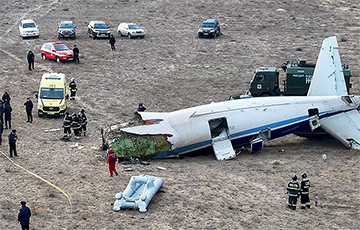Weapon That Russians Could Have Used To Shoot Down Passenger Plane Over Kazakhstan Named
34- 26.12.2024, 8:08
- 38,076

Some of the damage to the hull is cylindrical in shape.
More and more information indicates that the Embraer 190 plane, which was flying from Baku to Grozny and crashed in Kazakhstan, was shot down by Russian air defence.
Military expert Yan Matveyev ruled out the possibility of a cylinder explosion on board the plane, as stated by the Kazakh Ministry of Health and as Russian propagandists are trying to pick up on.
According to the analyst, such an explosion would hardly have caused chaotic damage to the plane's hull - from the tail section to the flap loop fairing.
However, a hit by a Pantsir-S1 anti-aircraft missile could have caused such a spread.
The analyst noted that some of the damage to the hull is cylindrical in shape, which corresponds to the shape of the missile's striking elements in the aforementioned air defence system.
The founder of the CIT analytical group, Ruslan Leviev, also believes that the holes on the body of the crashed airliner look like “air defence holes.”
German military observer Julian Repke, who spoke with an unnamed aviation expert, also points to external influence.
“The aviation expert tells me: ‘This does not look like damage from a crash. This really looks like an external influence,’” he wrote.
OSINT analyst Oliver Alexander adds that a bird strike or a crash could not have caused the existing entry and exit holes on the plane’s wreckage.
“It looks like each fragment that hit the plane had enough kinetic energy to pierce the skin, not just leave a dent,” the expert emphasized.











